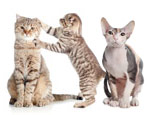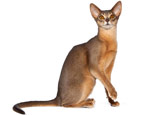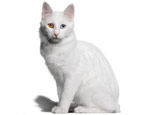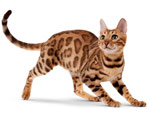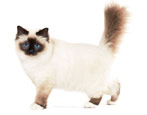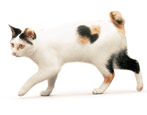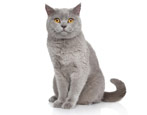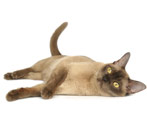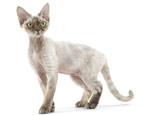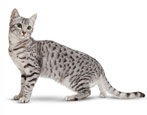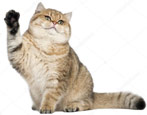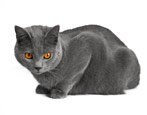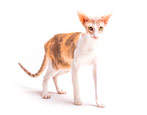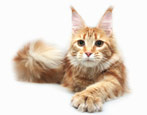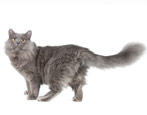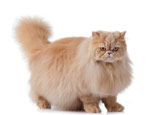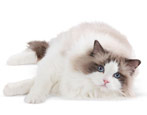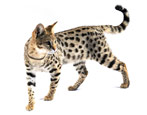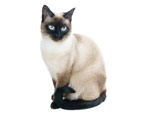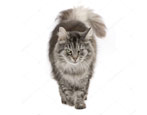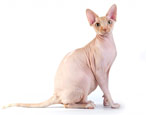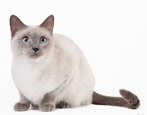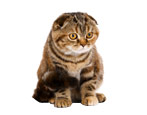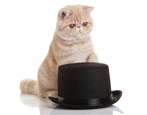How to care for a British kitten and adult cat?
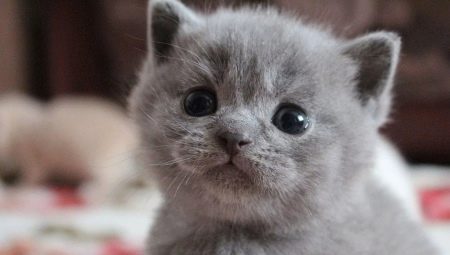
The British kitten with its round-eyed face, strong body and dense plush hair is able to touch anyone. This cheerful creature will fill every home with joy and will quickly turn into everyone's favorite. For a kitten, and then an adult cat, to be healthy, playful and look great, he needs to provide proper care.
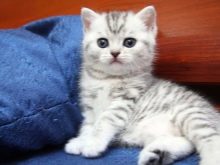
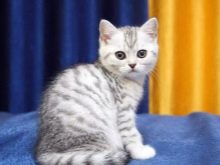
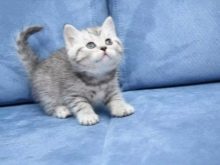
Character and habits
The description of the character of the British, most likely, will make you lean towards the idea of getting yourself a quadruple tailed dog of such a breed. The British, like most cats, are independent animals, easily enduring long loneliness and are able to occupy themselves at such intervals. Therefore, the British kitten is quite suitable as a friend for a busy person who does not spend too much time at home. Among the positive traits of these cats are the following:
- calm disposition;
- restraint with regard to children;
- getting along with other animals;
- innate nobility;
- unobtrusiveness;
- independence;
- high intelligence;
- sociability and good nature;
- resistance to stress;
- cleanliness.
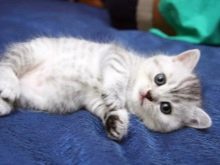
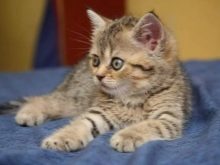
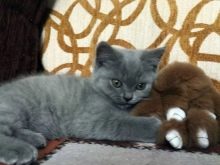
The difficulties of the character of the British include some stubbornness, which is difficult to overcome during upbringing, and a dislike for the requirements of a person. Like most cats, the British are vindictive. And if the owner decides, for example, to teach the fluffy how to behave correctly with the help of physical pressure, it will be very difficult to regain the cat's disposition. Taking a kitten into the house, you need to be prepared for the fact that this is a playful creature.
The British often amuse themselves by throwing things off high shelves.And they also like to take a position "somewhere higher", even if they are not playing at this time, then they "look around" from a height.
The British are inspectors for life. The owners often have to deal with the fact that their pets climb the bags. You can bring groceries from the store, turn away, and in a minute find that they are already being examined by the "tailed inspector", thrusting a curious muzzle into the bag.
The peculiarity of these cats is that they do not choose a specific owner. The British know how to perceive the whole family as a whole, without singling out someone one.
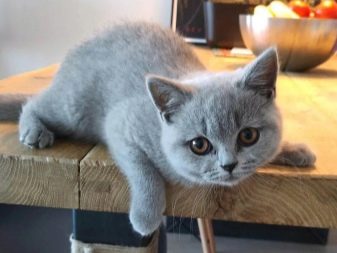
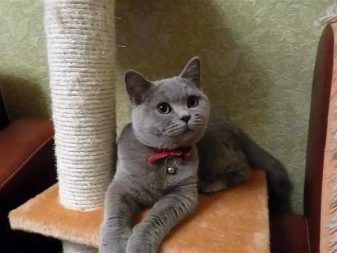
These tailed beasts show goodwill to the guests of the house. It is hard to imagine that such a cat will start to rears up at the sight of a stranger or in any other way to show him his disapproving attitude. If a British breed cat allows a child to play with him for a long time, then adults will not tolerate "increased attention and affection." This is not a beast that you can endlessly carry on your hands and stroke "until blue in the face." Excessive attention leads to the fact that the pet begins to hide and snort in displeasure.
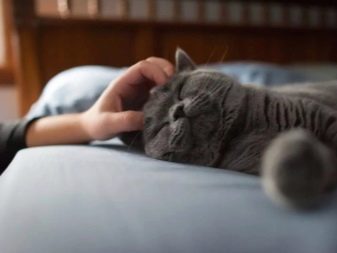
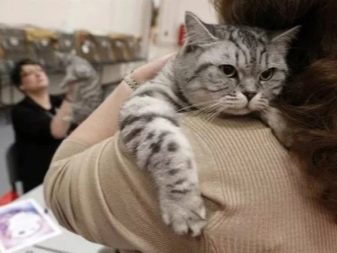
What does a kitten need?
To provide the little Briton with normal care and "living conditions", you need to purchase such necessary accessories as:
- cat litter with one or another filler;
- soft bed or house;
- bowls for food and water;
- scratching post;
- slicker;
- clothes for the street;
- carrying;
- toys.
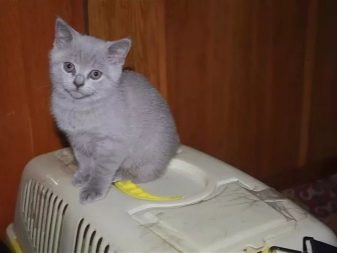
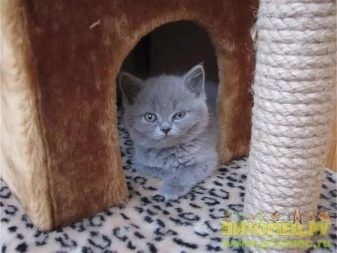
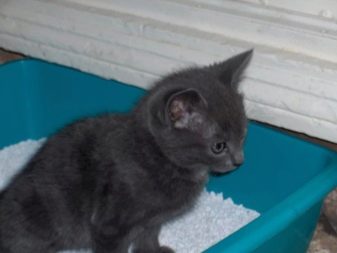
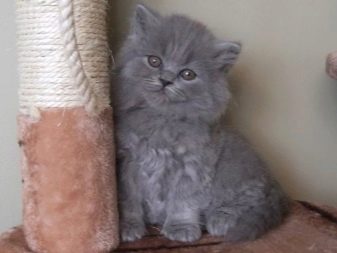
How and what to feed?
In order for a kitten to grow up cheerful, playful, healthy, and develop correctly, it must be fully fed from the first days. The diet should be balanced. There are two options for feeding at home - using regular food or ready-made store food. The finished feed has the following advantages:
- when creating it, all the necessary components necessary to saturate the kitten's body were taken into account;
- you don't have to think about cooking cat dishes - put it in a bowl and that's it.
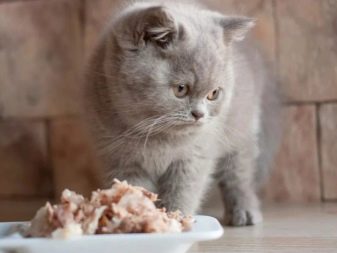
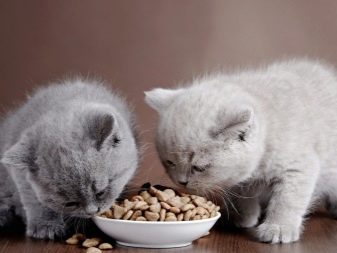
For feeding, use dry and wet food. It is better to buy special products of the same brand, focusing on the age of the pet. Information about who the food is intended for is indicated on the package. When feeding solid store food, care should be taken to ensure that so that there is clean fresh water at the ready. If you decide to feed the fluffy with natural products, you will have to deal with the preparation of food for him separately. The master's table food is not suitable.
If the kitten is recently born, it is natural for him to feed on breast milk. If it is taken away from the cat too soon, you need to use milk replacer, which can be found in veterinary pharmacies. From the age of one and a half months, the baby is transferred to goat or cow milk, diluted with boiled water to reduce fat content. After 30 days of life, in addition to milk, lean meat in the form of minced meat becomes part of the diet. Purr is fed with cottage cheese with a small percentage of fat, milk porridge from cereals.
Beef liver or poultry liver can be given every 7 days.
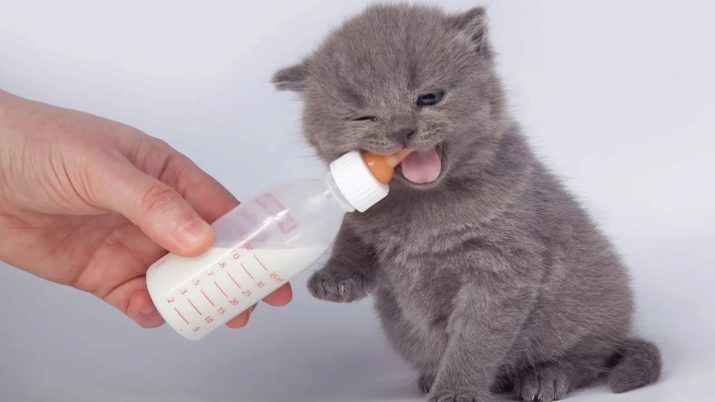
From the age of two months, the pet is offered store-bought canned food for kittens, boiled lean meat, and egg yolk. A month later, the little four-legged friend is introduced to fish food. All bones are removed from sea fish before consumption. And also from 3 months the kitten is offered boiled vegetables.
If before this age he was fed 5-6 times a day, now four meals a day are enough. At 5 months, the kitten is ready to eat all the foods that cats usually eat. Do not add spices and salt to cat dishes.
If the "fluffy child" is not satisfied with what he was offered, the leftovers should be immediately removed from the bowl, and the dishes themselves should be washed.
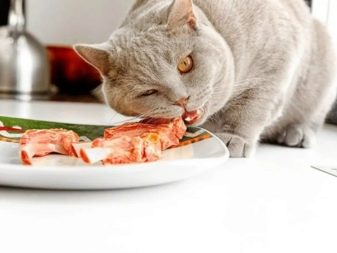

From half a year old, British cats are offered ordinary cat food with a significant content of lean meat, both cooked and raw.To give your pet raw meat and fish, they are first frozen in the freezer and scalded with boiling water before eating to avoid parasite infestation. Porridge and milk have not been given to the British for six months. This food is poorly digested in the body of an older cat, which leads to abdominal pain and irregular stools.
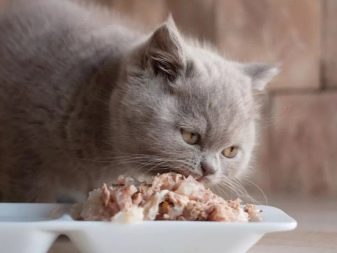
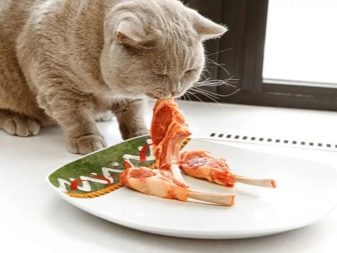
From year to year, food is provided depending on the preferences of a particular pet. And if the cat is neutered, you cannot give him fish and some other products. In this case, it is better to consult a specialist about the intricacies of the diet, as well as about the menu of older cats. From the age of eight, these animals are considered elderly. Their diet is different from the "youth" one. The tailed inhabitant of the apartment cannot be fed with chicken or turkey skins, paws.
It is advisable to supplement the meat with rice, buckwheat or barley. Fermented milk products remain part of the diet. You can feed an adult pet 2-3 times a day.
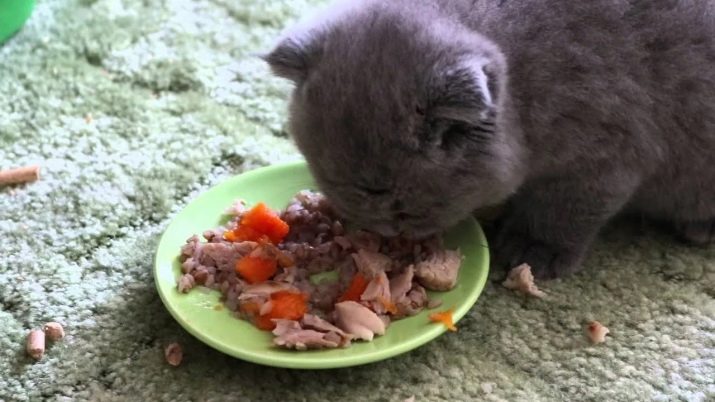
Toilet selection and training
To avoid troubles with the toilet, a kitten must be taught to do its small and big things in a specially designated place from a very young age. The pet will become dirty only if the point for the toilet is not suitable. To calmly relieve itself, a kitten needs a quiet place without witnesses. Before you take a new fluffy inhabitant to an apartment, you need to immediately determine where to put this very tray. If the kitten does not like the zone chosen by the owners, then it will be almost impossible to accustom him to a new one, which is located within the same house.
Teaching a British kitten to go to the toilet is not much different from teaching human children. As a child is seated on a potty by the hour, so is a tailed one. After each trip to the toilet, the tray needs to be washed and the filler changed in it. If the kitten has chosen an inappropriate point for its toilet affairs, knowledgeable people advise to treat it with a composition containing chlorine.
The strong smell should discourage the pet from the "fake toilet".
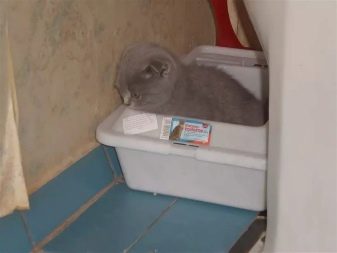
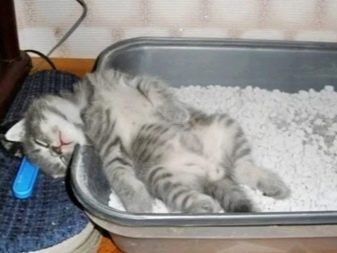
As for the tray itself, it should be comfortable for the animal. Many experts advise choosing a closed toilet... The "building" should have a high ceiling, considering that the matured cat will be quite large. It is desirable to use wood material as a filler, since it quickly absorbs liquid and does not allow the spread of unpleasant odors.
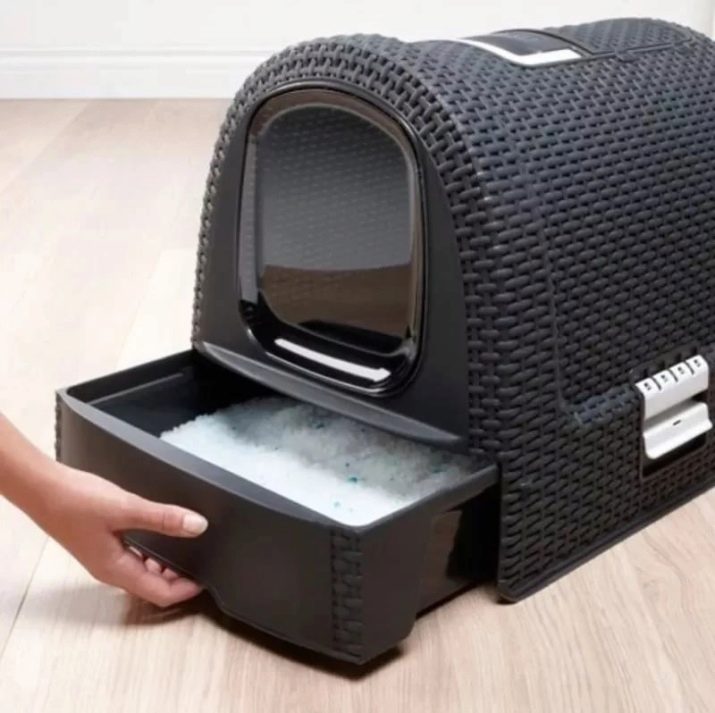
Care features
Keeping a British kitten requires proper care. From a young age, you need to watch out for to keep the cat's coat, ears and eyes healthy. The eyes of the British have to be cleaned periodically. Discharge is especially common in kittens. Small dirt is removed with cotton swabs or napkins dipped in water. There are special lotions for the care of cats' eyes. Some of these are used if the lacrimation becomes too profuse. And also there are tools for daily use.
Important! If you need to clean your cat's eyes, wash your hands first to prevent infection.
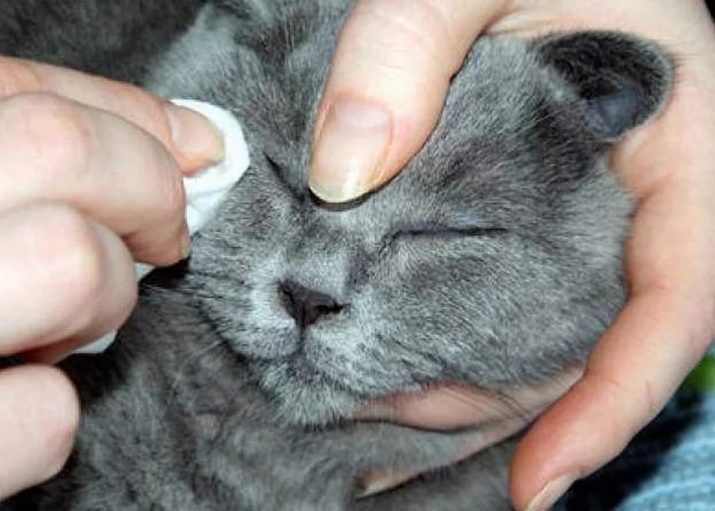
The British themselves take good care of their wool. But if, for example, you need to take your pet to an exhibition, you can bathe it. To do this, you need to use special shampoos for this breed of cats. To bathe a cat, you need to do the following:
- fill the basin by a third with warm water;
- put a cat there;
- holding it under the throat, lather the wool (it is impossible for water to get into the ears);
- wash off the foam with a watering can;
- You do not need to wash the "causal place" - the cat will not tolerate this;
- after finishing bathing, wrap the animal in a towel so that moisture from the wool is absorbed into it;
- after a while, comb through the fur and dry it with a hairdryer, without bringing the device close to the skin.
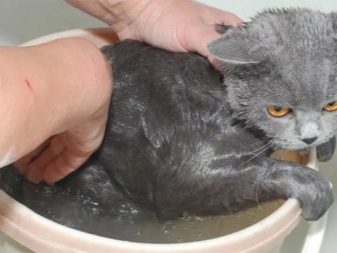
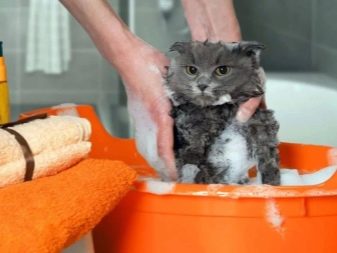
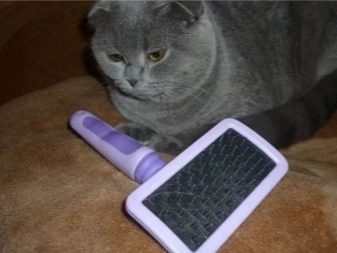
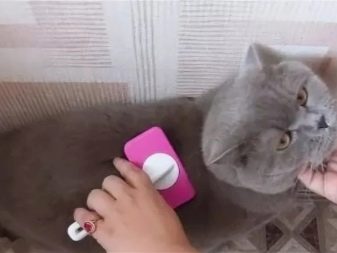
It should be borne in mind that to a large extent, the condition of the coat depends on whether the cat has enough vitamins from the food... To improve the appearance of your pet, in addition to regular food, you can give him special supplements that are offered in pet stores. It is better to take formulations that are suitable specifically for the British, taking into account the age of a particular pet.
The natural process is the molt of such animals. To avoid digestive problems, the cat will have to be given a special paste to remove hair from the stomach. In addition, the undercoat needs to be combed out several times a week. The cat is combed in the direction of hair growth, with the exception of the neck and muzzle.
They need to be combed against the grain. The British, unlike many other cats, take this massage favorably.
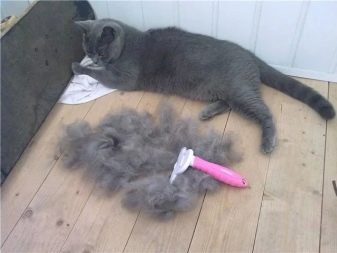
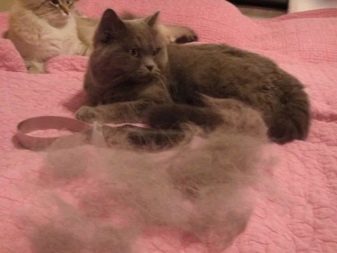
Twice a month a Briton should cut the claws on the front legs. On the back, this procedure is done monthly. The scratching post also helps keep your claws in order. When it comes to caring for your ears, you do not need to be diligent in cleaning them. "Scheduled" can be done once a month or if you can see that the ears are dirty... Hydrogen peroxide is used for purification. A small amount of liquid is applied to a piece of cotton wool or a disc and rubbed over the ear shell. Peroxide should not get deep into the ear canal.
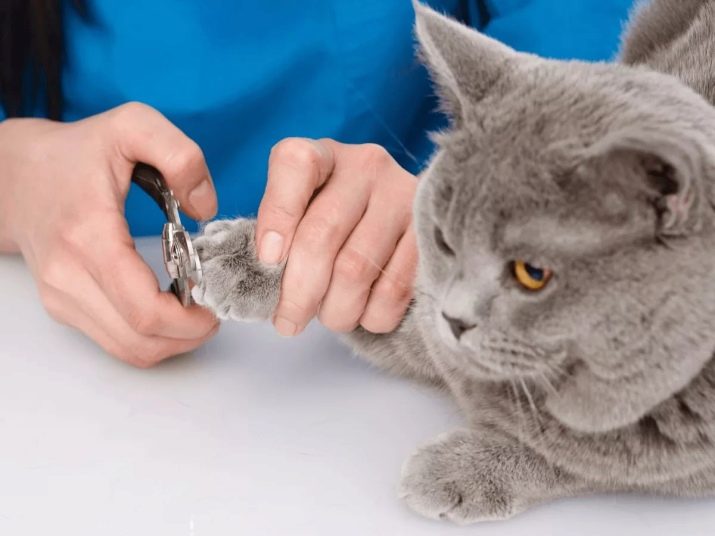
Many British owners consider grooming as part of grooming, although the other half of the lovers of such animals call it superfluous. The former motivate the need to cut cats by the fact that there is too much wool in the house, and the pets themselves suffer from the heat, given their thick undercoat. The latter are not ready to spoil what nature has generously endowed the pets with.
Grooming supporters should be aware that such a matter must be trusted by a specialist who knows in detail the feline anatomy. If you do a haircut yourself, you can injure the animal and bring a dangerous infection into its body. When cutting, the use of force is excluded so that the cat does not receive psychological trauma. The comfort of the animal's condition is largely determined by whether he likes the master.
If this is a person who sincerely loves felines and knows how to handle them, the Briton will react to his actions without fear or aggression.
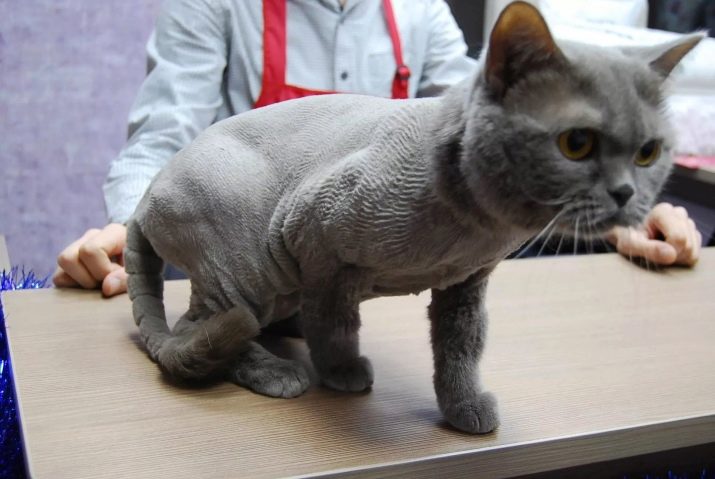
Part of caring for a kitten or adult cat is systematic vaccination. Vaccination is carried out according to the calendar. The first vaccine against panleukopenia, viral rhinotracheitis and calicivirus is administered to the kitten at 9-12 weeks, repeating it after 2 weeks. At 3 months, it is advisable to vaccinate the kitten against rabies. And also the British are vaccinated against the following diseases:
- chlamydia;
- microsporia;
- trichophytosis (versicolor);
- infectious peritonitis;
- leukemia;
- dermatosis.
Important! Vaccines are given to healthy animals in a veterinary clinic. Such procedures should not be carried out during the change of milk teeth to permanent ones, when cats' immunity decreases.
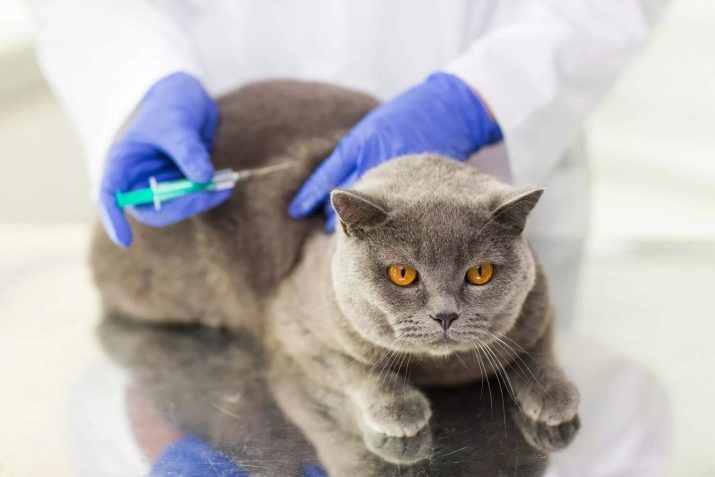
Games and parenting
Most often British babies are taken from the nursery at 3 months. But if the kitten got into the house at the age of 1 month, you need to keep in mind that the baby's fright cannot be avoided. This is quite natural. It is necessary to calculate in advance the likely places where the new tenant will whisk to hide from prying eyes. They are blocked in advance so that, in extreme cases, you do not have to move furniture, arrange searches, and so on.
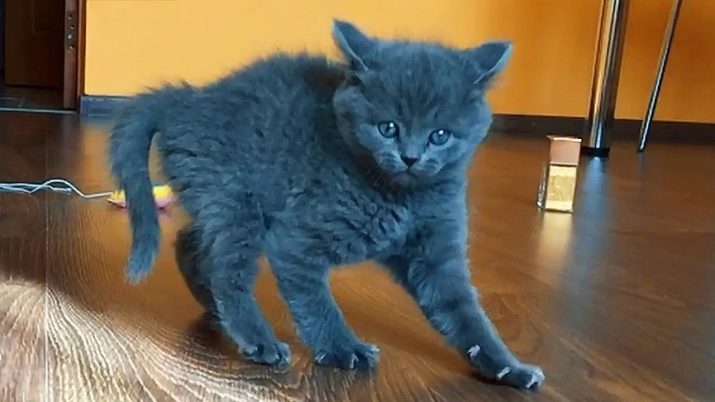
If the kitten does hide, it is better to give him the opportunity to sit quietly in the "trench" by moving the bowls with food and water closer. Until the four-legged child emerges from the shelter, it is desirable for someone from the family to be at home. Do not prematurely determine the place for the kitten's bed. The bedding should be placed in a place that the pet likes. If he liked a certain point in the apartment, he is unlikely to change his place of rest.
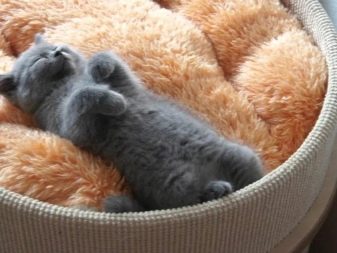
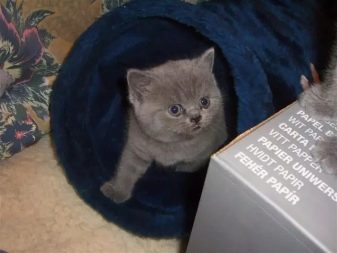
If there are children in the house, you will have to warn them in advance so that they do not squeeze the kitten, do not try to pull its tail, and so on. The voice for the new tenant must also not be raised. A baby will distinguish an affectionate intonation as well as a demanding one. You need to give the fuzzy time to adapt to the new environment.When the first psychological barrier is overcome, the kitten will begin to explore the house. His safety at this time is above all.
It must be borne in mind that the habits acquired in childhood will accompany the cat throughout his life. You need to give a good upbringing up to 2 years. The kitten should immediately be made clear that he is not the owner of the house, but a person. And that it is precisely the person who sets the boundaries of what is permitted. If the cat behaves in an approximate way, say, uses a scratching post for scratching, he should be encouraged with a treat. If the pet acts against the rules, it is required to make the suggestion in strict intonations.
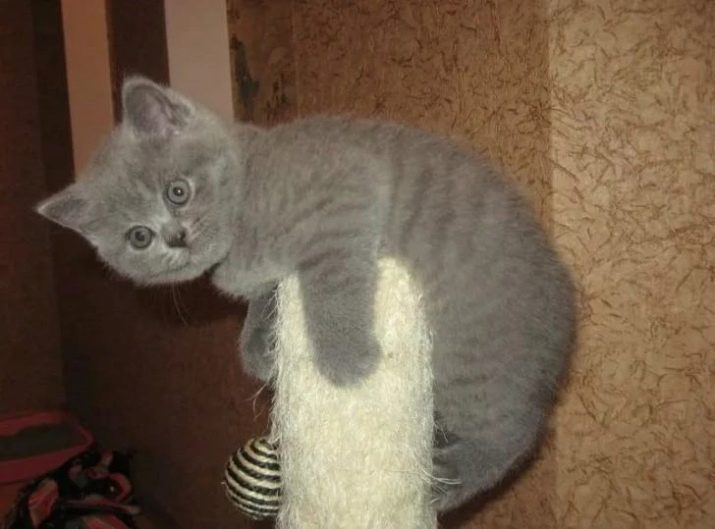
If, during the procedures for caring for the cat, he breaks loose and is scratched, you can take him by the scruff of his neck, look into his eyes and hiss menacingly. If he has not stopped struggling, he must not be released. If you step back, then the next time the cat will begin to show character again.
It is better to put it back in place right away than to endure scratches and marks from teeth.
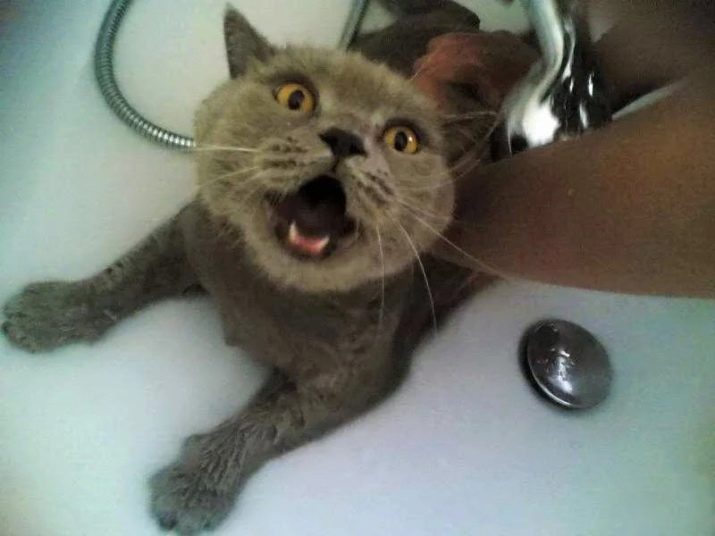
British kittens are playful. They like the following things:
- clockwork mice;
- small balls;
- dish sponges;
- empty bags that rustle loudly.
A kitten or an adult cat will recklessly chase the light spot of the laser pointer, sliding along the walls and floor. Such entertainment will bring a lot of joyful minutes both to the four-legged tenant and his owners. For people with even a little experience in dealing with cats, taking care of the British is not difficult.
If you find a common language with the "plush baby" from the first days, you can buy a pet for many years, which will only bring joy.
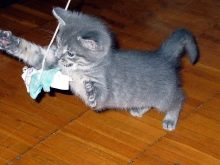
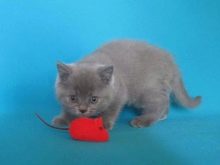
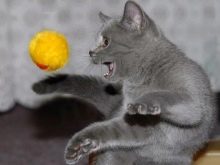
How to care for a British kitten, see below.
